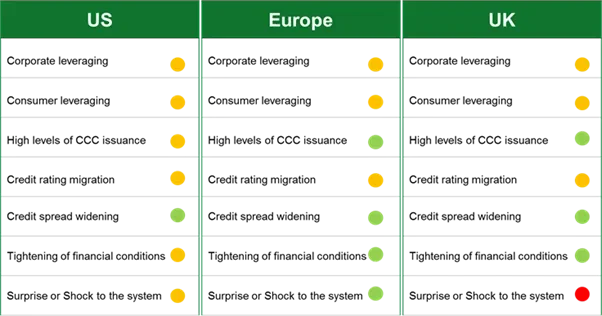Surprise or Shock to the System
One of the most important considerations for us as bond investors is determining where we are in the economic cycle. The inputs to this are something that we study at length every month from the huge amounts of data produced around the world. We all know now that this cycle is long in the tooth, but then so are many successful portfolio managers, and besides, age does not determine the end of the cycle! In fact the cycle looks in pretty good health when we look at the data.
In determining how close we are to the cycle’s end we can look at the shape of the yield curve as a popular guide, but there are many other factors and triggers that indicate how close we are. I have included our own traffic light system below to give you an idea of important other factors that we follow.
End of Cycle Warning Dashboard

Source: TwentyFour
At the bottom of the list we include a “Surprise or Shock to the system” indicator, as quite often we can have a dashboard that is amber and red but it takes something extra to push the economy over the edge and into recession. The UK had the referendum on Brexit, but at the time the dashboard was very green and as Mark Carney said the following morning, the banking system was extraordinarily well placed to absorb bad news. He was right, but had the dashboard been amber and red this event would likely have been enough to have triggered recession here in the UK.
The reason for writing today is that we have changed our “Surprise or Shock to the system” green light to amber in the US. Amber is just a warning light and probably still a long way from red, but it means we must be vigilant. The rationale for the amber is the possibility of a global trade war. In the short term protectionist measures are solely inflationary, which in itself should add pressure to the tightening of financial conditions, another of our monitors. However if the global responses are ones of escalation rather than symbolic retaliation, then this will surely hit global growth. How much it hits it is hard to determine at this stage, but investors must be alert to this.
Tuesday night’s reaction to Gary Cohn’s resignation as Trump’s Chief Economic Advisor has so far been quite muted but it does raise the possibility that President Trump has more measures to push through which the market may not take so well, and the possibility that his advisor did not want to be part of a policy error.
Last month’s theme for markets was certainly reflation, this month’s is likely to be about potential trade wars. This is an amber light that investors should want switched back to green.



